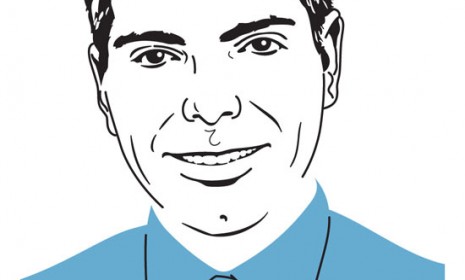Are sex scandals the only scandals Americans care about anymore?
The press loves sexy stories of Bubba, Weiner, and Ensign — but largely ignores rather stiff tales of official malfeasance


A free daily email with the biggest news stories of the day – and the best features from TheWeek.com
You are now subscribed
Your newsletter sign-up was successful
Last week, The New York Times called for Sen. Bob Menendez (D-N.J.) to "at least temporarily" relinquish his position as chairman of the Foreign Relations Committee over lingering ethics questions.
This is a big deal. Menendez faces scrutiny for his failure to properly report plane trips to the Dominican Republican provided by a donor (who happens to be under investigation for Medicare fraud) — as well as allegations that the senator inappropriately used his position to help secure a port security contract (worth hundreds of millions) for that same donor.
Further, it's interesting to note that the concerns listed by the Times appear to have nothing to do with the juicy allegations that Menendez also frequented underage prostitutes. As The Washington Post's Dana Milbank observed, "Menendez deserves opprobrium, some would argue, because he has acted like a prostitute himself."
The Week
Escape your echo chamber. Get the facts behind the news, plus analysis from multiple perspectives.

Sign up for The Week's Free Newsletters
From our morning news briefing to a weekly Good News Newsletter, get the best of The Week delivered directly to your inbox.
From our morning news briefing to a weekly Good News Newsletter, get the best of The Week delivered directly to your inbox.
This may be true. But here's my question: If the sexual allegations hadn't been made public in the first place, would we even be talking about the more mundane ethics concerns today? Are sex scandals the only scandals we really care about these days?
In the 1920s, the nation was rocked by the Teapot Dome scandal, which basically involved President Harding's secretary of the Interior receiving kickbacks for leasing oil fields.
Today, I suspect such allegations would be met with a collective yawn by the press corps since the scandal was devoid of, say, a congressman tweeting a nearly nude photo of himself.
Heck, one gets the feeling that Watergate might not even play today — unless there was a sex scandal attached to it.
A free daily email with the biggest news stories of the day – and the best features from TheWeek.com
Don't believe me? Bill Clinton, you'll recall, skated for years on boring accusations regarding Whitewater and cattle futures, among other things. It was only a sordid relationship with White House intern Monica Lewinsky that got the press salivating.
Sex sells. And if your scandal has a sexual component, you can bet the press will dig deeper than they otherwise would.
This is sort of what Charles Krauthammer implied when he argued that Gen. David Petreaus' cheating scandal would force the media to cover Benghazi.
"Now that the story is attached to a sex scandal," Krauthammer predicted on Fox News, "it will become a story that will be pursued by the media."
"Given the nature of our journalism," Krauthammer continued, "it will now become the hottest story around, and you can be sure that even the mainstream papers which did not show any interest whatsoever in this story up to and into the election are going to get on it now."
Things didn't necessarily pan out the way Krauthammer thought, but he was correct about a larger trend involving the tabloidization of the press.
Still, we're left with an interesting theory: Before the press will dig into a substantive corruption story these days, there has to be a sexy hook to get their attention — a possible pot of gold at the end of the rainbow.
Matt K. Lewis is a contributing editor at TheWeek.com and a senior contributor for The Daily Caller. He has written for outlets including GQ Politics, The Guardian, and Politico, and has been cited or quoted by outlets including New York Magazine, the Washington Post, and The New York Times. Matt co-hosts The DMZ on Bloggingheads.TV, and also hosts his own podcast. In 2011, Business Insider listed him as one of the 50 "Pundits You Need To Pay Attention To Between Now And The Election." And in 2012, the American Conservative Union honored Matt as their CPAC "Blogger of the Year." He currently lives in Alexandria, Va.
-
 5 cinematic cartoons about Bezos betting big on 'Melania'
5 cinematic cartoons about Bezos betting big on 'Melania'Cartoons Artists take on a girlboss, a fetching newspaper, and more
-
 The fall of the generals: China’s military purge
The fall of the generals: China’s military purgeIn the Spotlight Xi Jinping’s extraordinary removal of senior general proves that no-one is safe from anti-corruption drive that has investigated millions
-
 Why the Gorton and Denton by-election is a ‘Frankenstein’s monster’
Why the Gorton and Denton by-election is a ‘Frankenstein’s monster’Talking Point Reform and the Greens have the Labour seat in their sights, but the constituency’s complex demographics make messaging tricky
